|
|
|
Sort Order |
|
|
|
Items / Page
|
|
|
|
|
|
|
| Srl | Item |
| 1 |
ID:
128045


|
|
|
|
|
| Publication |
2014.
|
| Summary/Abstract |
The 2009 Renewable Energies Directive (RED) has set up ambitious targets concerning biofuel consumption in the European Union by 2020. Nevertheless, budgetary constraints and growing concerns about the environmental integrity of first-generation biofuels have imposed a phasing out of the fiscal instruments to promote them. Focusing on France, this paper combines an exogenous increase in oil prices and tax policies on fossil fuels. The objective is to determine the efficiency of an alternative incentive scheme for biodiesel consumption based on a higher price of the fossil fuel substitute. Policy simulations are implemented through a dynamic computable general equilibrium (CGE) model calibrated on 2009 French data. The results show that the 10% biodiesel mandate set by the RED would not be achieved even if the fixed taxes on diesel reach the same level as those on gasoline. Although integrating the rise in oil prices into the fiscal framework improves the biodiesel penetration rate, it remains below the target. Moreover, we find that the effects of biofuel consumption are limited to the biofuel chain sectors. In other agricultural sectors, the substitution effect of biodiesel with diesel is partially offset by the pricing effect induced by higher energy production costs.
|
|
|
|
|
|
|
|
|
|
|
|
|
|
|
|
| 2 |
ID:
188471


|
|
|
|
|
| Summary/Abstract |
DREAMS of a rapidly dawning age of carbon-free energy are not yet lost in Europe. But today, in anticipation of the inevitable cold, this topic has been put on the back burner. The German government has voiced concern that a shortage of gas this winter could lead to crisis in regions across Germany. Meanwhile, in France, heads of industry have serious concerns about the rising cost of gas. They are not ruling out the most grievous consequences, including a total collapse of industry.
|
|
|
|
|
|
|
|
|
|
|
|
|
|
|
|
| 3 |
ID:
191240
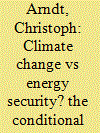

|
|
|
|
|
| Summary/Abstract |
The decarbonisation of Western societies requires a fundamental reorganisation of energy supply and fierce debates around the future energy mix have begun in many countries. However, we still know little about how concerns about energy security affect the public's energy preferences in view of the critique that renewable energies might compromise energy security. This paper argues that there is a perceived trade-off between energy security and climate protection that affects energy supply preferences in Western Europe. Using the European Social Survey's ‘Public Attitudes to Climate Change’ module, the findings from multilevel regressions demonstrate that there is indeed a perceived trade-off in energy preferences among Western Europeans. People concerned about energy security prefer coal, gas, and nuclear power over renewable energies. People worried about climate change prefer solar and wind energy over nuclear and fossil forms of energy. The analysis further identifies four different groups representing the trade-off between energy security and climate protection among Western Europeans. The paper thus identifies why energy preferences might collide and why some countries observe a polarisation of views around energy supply that policymakers need to address to realise a successful and publicly acceptable transformation of energy supply.
|
|
|
|
|
|
|
|
|
|
|
|
|
|
|
|
| 4 |
ID:
115169


|
|
|
|
|
| Publication |
2012.
|
| Summary/Abstract |
This paper analyzes consumer satisfaction in the energy sector in Kenya to assess the quality and level of service delivery. By use of the European Consumer Satisfaction Index (ECSI), the paper estimates consumer satisfaction in biomass, petroleum, electricity and renewable energy subsectors. The findings are that consumer satisfaction is highest in the renewable energy sub sector at 74.7% followed by petroleum at 62.8%. The electricity sub sector has the lowest consumer satisfaction of 53.06%. Further, it is found that the image of renewable energy providers is also the highest at 72.5% followed by that of petroleum companies at 63.1%. In the electricity sub sector, perceived value scored the highest at 64.2%. The paper concludes that image of a service provider, loyalty of consumers, consumer expectations, perceived value, perceived quality and the way complains are handled are very important factors that determine consumer satisfaction levels. It is recommended that for monitoring and evaluation purposes in the performance of the energy sector, the Energy RegulatoryCommission(ERC) could use the consumer satisfaction index level to evaluate whether the regulatory policies and their implementation are bearing fruit where a high index would be associated with good performance and vice versa.
|
|
|
|
|
|
|
|
|
|
|
|
|
|
|
|
| 5 |
ID:
127244


|
|
|
|
|
| Publication |
2014.
|
| Summary/Abstract |
There is an increasing political pressure on the city planning to create more energy efficient city plans. Not only do the city plans have to enable and promote energy efficient solutions, but it also needs to be clearly assessed how energy efficient the plans are. City planners often have no or poor know how about energy efficiency and building technologies which makes it difficult for them to answer to this need without new guidelines and tools. An easy to use tool for the assessment of the energy efficiency of detailed city plans was developed. The aim of the tool is for city planners to easily be able to assess the energy efficiency of the proposed detailed city plan and to be able to compare the impacts of changes in the plan. The tool is designed to be used with no in-depth knowledge about energy or building technology. With a wide use of the tool many missed opportunities for improving energy efficiency can be avoided. It will provide better opportunities for sustainable solutions leading to less harmful environmental impact and reduced emissions.
|
|
|
|
|
|
|
|
|
|
|
|
|
|
|
|
| 6 |
ID:
107771
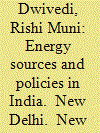

|
|
|
|
|
| Publication |
New Delhi, New Century Publications, 2011.
|
| Description |
xxxiii, 331p.
|
| Standard Number |
9788177082715, hbk
|
|
|
|
|
|
|
|
|
|
|
|
Copies: C:1/I:0,R:0,Q:0
Circulation
| Accession# | Call# | Current Location | Status | Policy | Location |
| 056269 | 338.790954/DWI 056269 | Main | On Shelf | General | |
|
|
|
|
| 7 |
ID:
088999
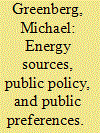

|
|
|
|
|
| Publication |
2009.
|
| Summary/Abstract |
To understand public preferences for energy sources, 2701 US residents were surveyed; 2101 of the respondents lived within 50 miles of a major nuclear facility. Over 90% wanted greater reliance on solar and wind, and over 70% wanted more reliance upon hydroelectric sources. Less than one-third wanted more use of oil and coal. Nuclear and natural gas sources were closer to an even split. Notably, those who lived near nuclear facilities favored the same sources, although a larger proportion of these respondents favored increasing use of nuclear power than in the national sample. These results are consistent with other United States surveys. The study found striking differences in preferences by age, ethnicity/race and other demographic characteristics that need in-depth investigation in order to help decision-makers and everyone else better understand public preferences about energy policy choices.
|
|
|
|
|
|
|
|
|
|
|
|
|
|
|
|
| 8 |
ID:
128424


|
|
|
|
|
| Publication |
2014.
|
| Summary/Abstract |
The Arctic, always before on the frigid edges of the international imagination, is becoming a hot topic in world affairs, particularly in Asia, because of its virtually untapped resources and increasing strategic importance. In 2012, the amount of cargo transported through the region more than doubled, and in May 2013 the Arctic Council, traditionally membered by Europe's Nordic countries, along with Russia, Canada, and the US, granted observer status to China, Japan, India, South Korea, Singapore, and Italy, a reminder that climate change is opening the Arctic to wider use and commercial exploitation, especially by Asian interests. Indeed, a Chinese shipping company sent that country's first commercial voyage through the Arctic in September 2013. And Russia is negotiating with Korean shippers about using the Northern Sea Route (NSR) for energy shipments. These developments are already bringing the Arctic and Asian security agendas together, and in the process changing Asia's strategic boundaries and planning.
|
|
|
|
|
|
|
|
|
|
|
|
|
|
|
|
| 9 |
ID:
133285
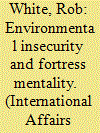

|
|
|
|
|
| Publication |
2014.
|
| Summary/Abstract |
This article explores the political, economic and ecological context within which environmental insecurity emerges and feeds back into a fortress mentality. Shortages of food, water and energy sources are the trigger for nefarious activities involving organized criminal networks, transnational corporations and governments at varying political levels. The consequences of such activities contribute to even more ruthless exploitation of rapidly vanishing natural resources, as well as the further diminishment of air, soil and water quality. These developments, in turn, exacerbate the competitive scramble by individuals, groups and nations for what is left. The accompanying insecurities and vulnerabilities ensure elite and popular support for self-interested 'security'. Accordingly, the 'fortress' is being constructed and reconstructed at individual, local, national and regional levels-as both an attitude of mind and a material reality. Fundamentally, the basis for this fortress mentality is linked to decades of neo-liberal policy and practice that have embedded an individualizing and competitive self-interest that, collectively, is overriding prudent and precautionary policy construction around climate change and environmental degradation. The net result is that security is being built on a platform of state, corporate and organized group wrongdoing and injustice, in many instances with the implied and/or overt consent of relevant publics. Yet, as long as the fortification continues apace, it will contribute to and further exacerbate varying levels of insecurity for all.
|
|
|
|
|
|
|
|
|
|
|
|
|
|
|
|
| 10 |
ID:
127263


|
|
Factors influencing perceptions of domestic energy information: content, source and process
/ Simcock, Neil; MacGregor, Sherilyn; Catney, Philip; Dobson, Andrew, Ormerod, Mark, Robinson, Zoe Ross, Simon Royston, Sarah Hall, Sarah Marie
|

|
|
|
|
| Publication |
2014.
|
| Summary/Abstract |
Reducing household energy consumption is an essential element of the UK Government's carbon reduction strategy. Whilst increased knowledge alone will not necessarily lead to tangible actions on the part of consumers, knowledge of various kinds is, we argue, still important if domestic energy usage is to be reduced. In an attempt to 'educate' the public, governments have typically resorted to 'mass information' campaigns that have been considered largely unsuccessful. Yet understanding what alternative forms of learning could be cultivated has been limited by the dearth of research that explores whether and why people consider information about energy and energy saving to be useful. By exploring this, we can move towards an understanding of how knowledge about energy saving can be better shared and communicated, enabling more meaningful learning to take place. Drawing on in-depth qualitative data with fifty-five participants, this paper highlights a range of factors that affect perceptions of energy information. It argues that these factors are not discrete, but are interlinked. A fundamentally different model of knowledge exchange is needed for more effective learning about energy saving to occur. A number of implications for policy are proposed in our conclusions.
|
|
|
|
|
|
|
|
|
|
|
|
|
|
|
|
| 11 |
ID:
184904


|
|
|
| 12 |
ID:
127896
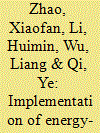

|
|
|
|
|
| Publication |
2014.
|
| Summary/Abstract |
Local governments have replaced the national ministries that are in charge of various industries to become the primary implementer of energy-saving policies in China since 2000. This paper employs a case study-based approach to demonstrate the significance of local governments' policy measures in assisting industrial enterprises with energy-saving activities in China. Based on the longitudinal case of the Jasmine Thermal Electric Power Company, this paper hypothesizes that sub-national governments have played a major role in implementing energy-saving policies in China since the 11th Five-year-plan period. A wide range of provincial and municipal agencies collaborated in implementing five types of policy measures - informational policy, skill building, improved enforcement of central directives, price adjustment, and funding - that reduced barriers to energy saving and motivated active pursuit of energy-saving activities at industrial enterprises. The case study demonstrates how an enterprise and local governments work together to achieve the enterprise's energy-saving target. The authors will investigate the hypothesis of this paper in the context of multiple case studies that they plan to undertake in the future.
|
|
|
|
|
|
|
|
|
|
|
|
|
|
|
|
| 13 |
ID:
118047
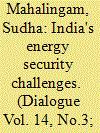

|
|
|
| 14 |
ID:
130933
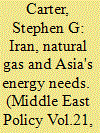

|
|
|
|
|
| Publication |
2014.
|
| Summary/Abstract |
Demand for natural gas in Asia has grown steadily during the past decade and is expected to increase considerably in the next 20 years. This growth in demand has paralleled an increasingly aggressive regime of international sanctions on Iran over its nuclear-weapons program. Considering the importance of maintaining economic pressure and political solidarity in sanctions regimes, the projected growth of demand for natural gas in some of the world's fastest-growing economies is creating both short- and long-term strategic implications for the United States and its allies. With one of the world's largest reserves of natural gas and an enviable geographical location as a likely hub for energy transit, Iran is in an excellent strategic position to benefit economically and politically from this growth in demand. While recent sanctions have dealt a damaging blow to Iran's oil exports and economy, agreement on sanctions on Iran's underdeveloped natural-gas industry has been more tepid, as nations such as Pakistan, India and China, among others, candidly weigh their options to solve increasingly dire short-term energy demand and create long-term energy security. Development of Iran's natural-gas industry to the point at which is it is able to meet demand in these nations would bring in considerable revenue for the regime, potentially enough to offset much of the economic impact of sanctions. Of particular importance to the United States and its allies, then, are answers to the following questions: Does Iran currently have the infrastructure to meet this demand? How long would it take Iran to develop the necessary infrastructure in the event nations that have expressed interest in Iran's natural gas opt against the pressure of sanctions? How likely are the above-mentioned nations to eventually contravene sanctions? How are changes in the global natural-gas industry impacting Iran's potential share of the regional and international market? And is there enough natural gas from other sources available to meet demand in nations like Pakistan, India and China?
|
|
|
|
|
|
|
|
|
|
|
|
|
|
|
|
| 15 |
ID:
127908


|
|
|
|
|
| Publication |
2014.
|
| Summary/Abstract |
We seek to evaluate the extent of the pass through of increased fuel and carbon costs to wholesale prices with a shift of generation from coal-fired to gas-fired plants. Modelling of Australia's National Electricity Market in 2035 is undertaken using Australian Energy Market Operator assumptions for fuel costs, capital costs and demand forecasts. An electricity market simulation package (PLEXOS), which uses deterministic linear programming techniques and transmission and generating plant data, is used to optimize the power system and determine the least cost dispatch of generating resources to meet a given demand. We find that wholesale market prices increase due to the full pass through of the increased costs of gas over coal as an input fuel and the Carbon Price. In addition, we find that wholesale prices increase by more than the pass through of fuel and carbon costs because of the fact that generators can charge infra-marginal rents and engage in strategic behaviour to maximize their profits.
|
|
|
|
|
|
|
|
|
|
|
|
|
|
|
|
| 16 |
ID:
085490
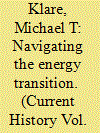

|
|
|
| 17 |
ID:
127294


|
|
|
|
|
| Publication |
2014.
|
| Summary/Abstract |
A nation-wide survey was conducted in 2010 to investigate the Australian public's attitudes to nuclear power in relation to climate change and in comparison to other energy alternatives. The survey showed a majority of respondents (42%) willing to accept nuclear power if it would help tackle climate change. Following the disaster at the Fukushima Daiichi Nuclear Power Complex in Japan, an event triggered by the 11 March 2011 Tohoku earthquake and tsunami, it was expected that support for nuclear power in Australia would change. In light of this, a follow-up survey was conducted in 2012. Indeed, the post-Fukushima results show a majority of respondents (40%) were not willing to accept nuclear power as an option to help tackle climate change, despite the fact that most Australians still believed nuclear power to offer a cleaner, more efficient option than coal, which currently dominates the domestic production of energy. Expanding the use of renewable energy sources (71%) remains the most popular option, followed by energy-efficient technologies (58%) and behavioural change (54%). Opposition to nuclear power will continue to be an obstacle against its future development even when posed as a viable solution to climate change.
|
|
|
|
|
|
|
|
|
|
|
|
|
|
|
|
| 18 |
ID:
129318
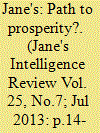

|
|
|
| 19 |
ID:
169903


|
|
|
|
|
| Summary/Abstract |
Brazil has achieved significant advances in climate mitigation by reducing its greenhouse gas (GHG) emissions in the last decade. Additionally, Brazil commits to furthering its actions through the Nationally Determined Contributions (NDC), issued during the Paris Agreement. The country also anticipates a significant increase in GDP in the years to come. Chen et al. (2012)'s main conclusion was that if deforestation were to be greatly reduced, the burden of cutting CO2 emissions from energy use and industrial processes would be minimal. However, recent data on land-use emissions show that additional efforts might also be required in the energy sector. Using Brazil's industrial structure, we evaluate the minimal changes needed in domestic final demand to meet both the NDC target and the forecasted economic growth. Our results show that it may be possible to meet both objectives with policies that incentivize a service-oriented economy while lowering investments in the manufactuing and extracting sectors. Furthermore, this strategy could be net job-creating, would rely on fewer imported products, and would generate tax revenue. However, wages could decrease.
|
|
|
|
|
|
|
|
|
|
|
|
|
|
|
|
| 20 |
ID:
086799


|
|
|
|
|
| Publication |
2009.
|
| Summary/Abstract |
Biofuels have the potential to provide a partial solution to the world's energy and environmental problems.Motivated by a desire to reduce their dependency on imported oil and to ensure the security of fuel supplies, as well as the need to create a clean, renewable energy source, developed and developing nations alike are looking to shift their fuel dependency away from oil and are investing heavily in the development of biofuel industries.
|
|
|
|
|
|
|
|
|
|
|
|
|
|
|
|
|
|
|
|
|